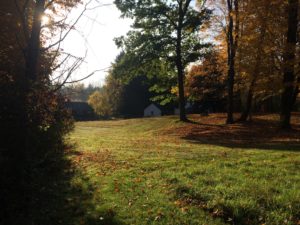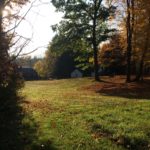 They were dead. Or dying. Two crab apples that had been strangled by vines. A great old dark cherry, standing astride our back woods, that had been riddled by insects and then jackhammered by woodpeckers and sapsuckers for so many years that its insides had been hollowed out. Still, I hated to see them go. They’d been home to who knows how many generations of birds and squirrels. Every winter the deer made a pilgrimage to scavenge for fruit at the foot of the crab apples. They’d been living on our property far longer than we had and were a part of the spirit of the place. I’ve long believed in the secret lives of trees. As a child, moving to a new town where I had no friends, I turned to the trees on our property for companionship — and found it there, in the quiet fragrant shadows under the hemlocks. There’s more and more evidence that trees communicate, sending signals through underground networks, alerting each other of drought or disease or insect attacks. They share water and nutrients and sun. When two trees are closely connected, writes the German forester and renowned tree expert Peter Wohllben, it’s often the case that “when one dies, the other dies soon afterward, because they are dependent on each other.”
They were dead. Or dying. Two crab apples that had been strangled by vines. A great old dark cherry, standing astride our back woods, that had been riddled by insects and then jackhammered by woodpeckers and sapsuckers for so many years that its insides had been hollowed out. Still, I hated to see them go. They’d been home to who knows how many generations of birds and squirrels. Every winter the deer made a pilgrimage to scavenge for fruit at the foot of the crab apples. They’d been living on our property far longer than we had and were a part of the spirit of the place. I’ve long believed in the secret lives of trees. As a child, moving to a new town where I had no friends, I turned to the trees on our property for companionship — and found it there, in the quiet fragrant shadows under the hemlocks. There’s more and more evidence that trees communicate, sending signals through underground networks, alerting each other of drought or disease or insect attacks. They share water and nutrients and sun. When two trees are closely connected, writes the German forester and renowned tree expert Peter Wohllben, it’s often the case that “when one dies, the other dies soon afterward, because they are dependent on each other.”
I took the photo above from beneath an old maple, one of the trees we had taken down a few days ago. This was its view for many years before it was ever mine. And here’s a poem about trees by our current Poet Laureate Joy Harjo. Born in Tulsa Oklahoma, she’s a member of the Muscogee (Creek) Nation and draws from an ancient tribal sense of oneness with the natural world.
Speaking Tree
Joy Harjo
I had a beautiful dream I was dancing with a tree —Sandra Cisneros
Some things on this earth are unspeakable:
Genealogy of the broken—
A shy wind threading leaves after a massacre,
Or the smell of coffee and no one there—
Some humans say trees are not sentient beings,
But they do not understand poetry—
Nor can they hear the singing of trees when they are fed by
Wind, or water music—
Or hear their cries of anguish when they are broken and bereft—
Now I am a woman longing to be a tree, planted in a moist, dark
earth
Between sunrise and sunset—
I cannot walk through all realms—
I carry a yearning I cannot bear alone in the dark—
What shall I do with all this heartache?
The deepest-rooted dream of a tree is to walk
Even just a little ways, from the place next to the doorway—
To the edge of the river of life, and drink—
I have heard trees talking, long after the sun has gone down:
Imagine what would it be like to dance close together
In this land of water and knowledge. . .
To drink deep what is undrinkable.



Wonderful poem. Trees have always spoken to me….I would be berefit if I had to live somewhere without trees. I have a big ash tree out front of my apartment building in this city in Maine. I grew up in urban CT., but even in the city of New Haven were many trees, including elms. It is the “Elm City.” I love the green leafiness found in New England ….and the beautiful colors of fall. I love trees in all seasons.It is always sad to lose one.
How wonderful to grow up among elms, Cheryl. I never knew New Haven was known has Elm City — thank you!
How timely. We were just out to Yosemite marveling at the amazing variety of trees. Huge trees, unlike anything I’d seen before, with bark patterns intricate and otherworldly. So sorry you had to lose your wonderful trees. =p.
Thanks, Phyllis. I remember feeling the same sort of awe wandering though the Redwood Forest in California where the trees are said to be the tallest living things on earth.
Bless you for reminding us of the deeper knowing we all share…
Thank you, Leslie. Always lovely to hear from you!
I live in midtown New York City
I live in the back apartment
of a brownstone on a busy commercial street
There is a tree on the property and there are trees on the two lots behind me
Periodically I hear “caw caw” and look out the window hoping to see where the sound is coming from and what is making it.
today I saw a pair of Blue Jays hopping from one tree to the next and then the next and then they were gone…
I have a feeling the Blue Jays will be back, Annette. They’re wonderful to watch — so smart and sassy!
I believe trees, like plants, are sensitive souls who respond to the environment around them. And are like people in respect some live long, long lives, and others short. It was quite an awakening for me when trees where I worked – seemingly healthy and large – suddenly crashed down causing damage to the building. On the outside they looked fine, but inside all hollow and no longer able to stand on their own. Water Oaks I think we were told. It was like they took their own lives, and it was sad.
Wow — what a story, Carole. We are lucky to have a very knowledgeable young man in the Berkshires to advise us on whether a tree is dead or not well. As it turns out, he decided one of our crab apples is going to make it — so he didn’t take it down (though he would have made more money doing so).
Joy Harjo’s poem speaks of the longing for being part of nature, instead of its destroyer. Today as I was walking past a park, I came upon a circle set in stone, the middle of which bore a sawn off tree trunk, and all around that circle were other circles, with the plane trees still intact, old and weathered, and perhaps at the end of their lives, but there. Thank you for writing about the end of those maples’ lives.
Thank you, Patty. There’s a long esplanade in Riverside Park lined with plane trees — it’s one of my favorite vistas on earth.
Thank you for this acknowledgment of trees, such a very important part of our lives. Wonder if you have read Richard Powers’ The Overstory, a novel. Perhaps one of the most important books of this time. We do share dna with trees. Best to you and your trees
Thank you. I started it a few months back but put it aside for other things. I’m back to reading it now, thanks to you, and am deeply immersed. It’s a marvelous book — so worthy of all the prizes and praise it’s received.